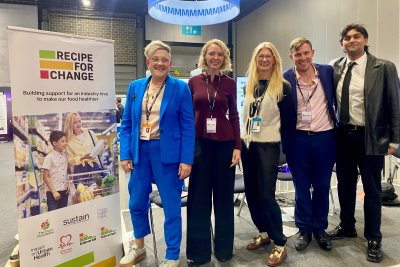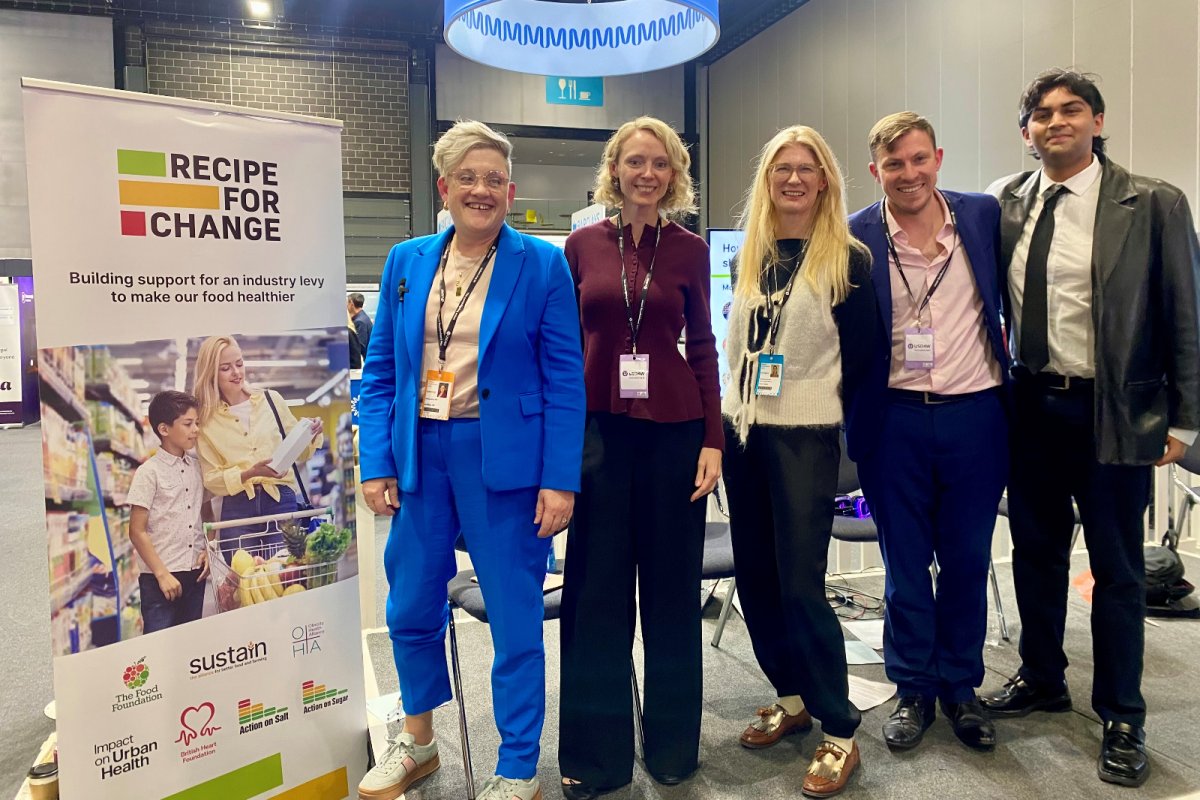 Recipe for Change panel L-R: Ashley Dalton MP, Lauren Woodley, Katharine Jenner, Richard Sloggett and Dev Sharma. Credit: Sustain
Recipe for Change panel L-R: Ashley Dalton MP, Lauren Woodley, Katharine Jenner, Richard Sloggett and Dev Sharma. Credit: Sustain

“We need to change the recipe of our food, our system and how we do policy”: Reflections from Labour conference
From the food on our shelves to the policies shaping our health system, it’s clear that children’s health can no longer be treated as an afterthought. At this year’s Labour party conference, our Recipe for Change panel and many other discussions made the same case: if we want a fairer, healthier future, we need to change the recipe.
It was impossible to walk through this year’s Labour party conference without noticing how often children’s health came up. Whether on the main stage or in packed fringe rooms, one thing was clear: the government cannot afford to ignore the conditions shaping the health and wellbeing of the next generation.
Our campaign was proud to host a panel that brought this challenge into sharp focus. The discussion was chaired by Richard Sloggett, Founder and Programme Director of Future Health, who guided a lively and thought-provoking conversation between leaders from health, policy and the food industry.
Katharine Jenner, Executive Director of the Obesity Health Alliance and a Recipe for Change campaign partner, captured the feeling in the room powerfully:
“Is this really the best we can do?
When you look at the levels of diet-related ill health in this country, the widening health inequalities, what’s on our supermarket shelves, what’s pushed at us on our high streets and delivery apps, and how much a healthy diet costs – the answer is pretty clear:
No, we can do better.”
The panel discussion more broadly underlined three clear themes:
- First, that children and young people are flooded with unhealthy food options on shelves, on billboards and on their phones, many of which directly target them.
- Second, that well thought out regulation can benefit everyone, from young people to businesses themselves.
- And third, that the biggest risk to the Government’s ‘moonshot’ ambition on reducing obesity is delay and dilution, including interference from big businesses.
Our speakers drew on their diverse expertise to bring these points to life.
Katharine Jenner continued:
"New treatments like drugs and surgery can help some people. But they are expensive, they reach relatively few, are not well tolerated by everyone and they don’t solve the problem at scale. Obesity is a chronic, relapsing condition – we can’t treat two-thirds of the population indefinitely. We need those options, yes, but we must also stop so many people needing them in the first place.
"That’s the cycle we have to break.
"And we know what works. Look at the Soft Drinks Industry Levy [SDIL]. It was announced in 2016, introduced in 2018, and it was simple: high-sugar drinks were taxed more, low-sugar drinks less, sugar-free drinks exempt. The result? Almost all major companies reformulated. Consumers kept their choice. Prices didn’t spike. Companies and the economy didn’t collapse.
"The SDIL lessons for the Government’s moonshot?
- It was mandatory, not voluntary.
- It targeted manufacturers, not consumers.
- It was designed not to raise money, but to make products healthier.
- Companies had flexibility how implemented reduce the sugar, reduce portion sizes, shift marketing to their other low sugar products, or pay the tax
- And it gave companies time to prepare – but crucially, not to block or dilute it.
"So what’s the scale of the challenge in shifting from treatment to prevention? It’s big – but we’ve already seen the tools that work.
"Now we need to apply them more widely to the moonshot. That means:
- An industry levy on manufacturers, to drive reformulation
- A new mandatory Healthy Food Standard, starting with proper monitoring and reporting
- Then mandatory targets, so healthier marketing, placement and stocking become the norm
- And swift, robust implementation – because policies only work if they’re actually delivered"
Ashley Dalton MP, the Minister for Public Health and Prevention, emphasised the need for a “cultural shift so everyone can buy healthy food and it’s normal to do so.” She also set out how the government intends to back this up - including measures such as introducing mandatory reporting for big food businesses, with healthy food sales targets to follow. Importantly, she also stressed that just because something isn’t written into the 10 Year Health Plan now doesn’t mean it won’t be in the future.
Youth activist Dev Sharma reminded us of the way that advertising works to target young people, telling us the “system is rigged against young people” and adding, “never tell me that it’s easy to be healthy in that food landscape.”
Meanwhile, Lauren Woodley from Nomad Foods explained what her company has been doing to improve the healthiness of their products and move an increasing number out of being classified as high in fat, sugar and salt (HFSS). She made clear that as well as proper enforcement of policies being necessary, we need to “not go backwards, let’s keep adding [policies that] support the food system.”
Together, these voices from health, policy and the food industry reinforced the same conclusion: a healthier future for children will only be possible if we change the system itself. And that conclusion resonated well beyond our panel. From sessions on poverty and education to debates about the NHS, the same arguments were being made across the conference. Tackling poor health in childhood is not a “nice to have” – it’s fundamental to reducing pressure on public services, unlocking opportunity, and building a fairer society.
So, what next?
Looking ahead, the focus must now be on delivering the kind of long-term strategies that can truly “change the recipe.” Central to this is a 10 Year Health Plan that puts prevention at its core and ensures children’s health is prioritised from the start. The government must also ensure that the lessons above from the SDIL are applied - policies must not be delayed, watered down, or place undue emphasis on the involvement of health-harming industries. Alongside this, a bold national food strategy is needed to reshape the food environment so that healthier options become the easiest ones for families everywhere.
And finally, to return to the words of Katharine Jenner:
“So, if I walked outside and asked anyone on the streets of Liverpool the same question, is this the best we can do? I would get the same answer as in this room – No. We can – and must – do much better.
Because the health of our children, the future of our NHS, and the strength of our economy all depend on it.
We need to change the recipe.”
Children's Food Campaign: Campaigning for policy changes so that all children can easily eat sustainable and healthy food.
Sustain
The Green House
244-254 Cambridge Heath Road
London E2 9DA
020 3559 6777
sustain@sustainweb.org
Sustain advocates food and agriculture policies and practices that enhance the health and welfare of people and animals, improve the working and living environment, promote equity and enrich society and culture.
© Sustain 2026
Registered charity (no. 1018643)
Data privacy & cookies
Icons by Icons8







